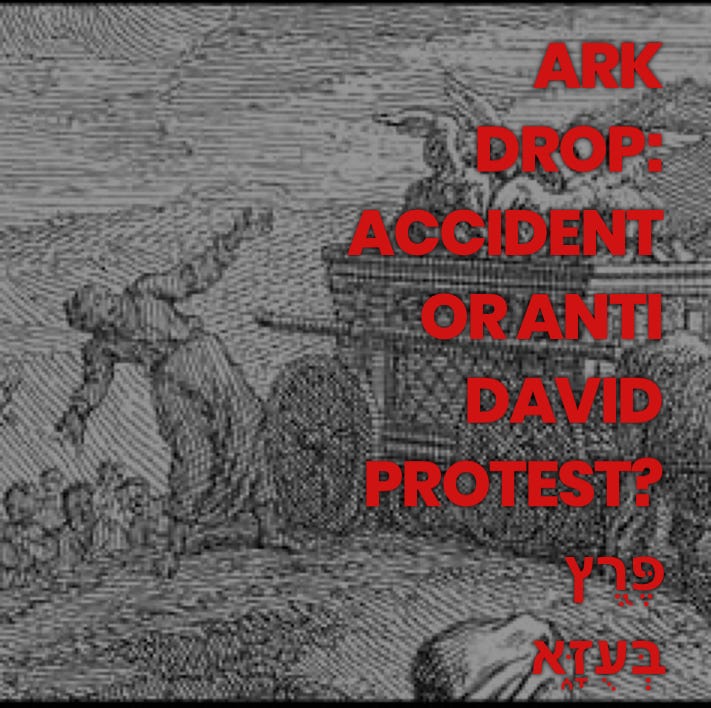Crisis brings us together. As does celebration. And when celebration becomes a crisis - an even deeper sense of unity is forged.
During this difficult crisis- we all need different ways of feeling connected and finding solidarity. Sometimes it’s organic - sometimes it’s forced.
In today’s story King David wants to create a celebration of unity, using the central icon of the religion as focalizer of faith that will bring the people closer together, cement his leadership and capital - despite their vast differences.
He plans to bring the Ark of the Covenant from its temporary spot in the hills - up to his new capital city of Jerusalem - as soon as he can. The plan falls through, at least initially, because the ark itself falls off the wagon but we wonder if that’s what happened or if there was another, more planned, reason for the interruption.
In the older version of the story, back in Samuel - it takes a few years, at least, for this project.
But in this version it’s the next thing that happens after the conquest. And that’s not the only notable difference.
This author not only wants us to know that David’s priority is restoring the ark from its temporary resting place to a new prominent public platform on the top of the mountain that will one day contain the Jewish temple - there is also explicit mention here that this decision was done after a consultation with the leaders and elders, with shared consent and consensus.
In the earlier version of this story there is no mention of consultation with others. That’s more his style.
Bu in today’s chapter we see a democratic decision-making process towards consensus:
וַיִּוָּעַ֣ץ דָּוִ֗יד עִם־שָׂרֵ֧י הָאֲלָפִ֛ים וְהַמֵּא֖וֹת לְכׇל־נָגִֽיד׃
וְנָסֵ֛בָּה אֶת־אֲר֥וֹן אֱלֹהֵ֖ינוּ אֵלֵ֑ינוּ כִּֽי־לֹ֥א דְרַשְׁנֻ֖הוּ בִּימֵ֥י שָׁאֽוּל׃
וַיֹּאמְר֥וּ כׇֽל־הַקָּהָ֖ל לַעֲשׂ֣וֹת כֵּ֑ן כִּֽי־יָשַׁ֥ר הַדָּבָ֖ר בְּעֵינֵ֥י כׇל־הָעָֽם׃
David consulted with the officers of the thousands and the hundreds, with every chief officer:
Shall we transfer the Ark of our God to us, for throughout the days of Saul we paid no regard to it?
The entire assembly agreed to do so, for the proposal pleased all the people.
I_Chronicles.13.3-4
Chronicles works hard here to show that the ark’s journey to Jerusalem was undertaken with broad public consent.
Like many leaders, David criticizes his predecessor—Saul—and frames his own initiative as a correction of Saul’s era, even though we do have evidence of Saul turning to the ark for guidance during his reign.
But the big drama is what happens next - the first attempt to bring the ark to Jerusalem fails.
The ark slips off the wagon during the festive parade and almost falls to the ground when a man by the name of Uzza tries to stop it: As a reward he is struck down dead on the spot. One is not supposed to touch the sacred object that contains the Torah.
David’s lavish plan had to wait and the ark was stored in a nearby barn for a few more months.
There’s something about this accident that includes a peek through the cracks at what may be a note of social criticism—conscious or not—of David’s talk of unity.
When he summons the people for their consent to the project he uses the words “ “If you approve, and if YHWH our God concurs, let us send far and wide to our remaining kinsmen throughout the territories of Israel”.
The Hebrew for ‘send far and wide’ is ‘nifrotza’ - and the same root word echoes again when the accident occurs - used to indicate a breach:
וַיִּ֣חַר לְדָוִ֔יד כִּֽי־פָרַ֧ץ יְהֹוָ֛ה פֶּ֖רֶץ בְּעֻזָּ֑א וַיִּקְרָ֞א לַמָּק֤וֹם הַהוּא֙ פֶּ֣רֶץ עֻזָּ֔א עַ֖ד הַיּ֥וֹם הַזֶּֽה׃
David was angry because YHWH had burst out - paratz (פָּרַץ) against Uzzah; and that place was called Perez-Uzzah to this day.”
I_Chronicles.13.11
This spot was named for a crisis - the Breach of Uzza.
But what sort of crisis? What’s the reason for the breach?
Was the name of this spot where the ark fell named for the accident of Uzza - or is it hinting at a more deliberate resistance backstory we are not made aware of? Was it an accident - or an act of protest? Did the ark fell - or was it dropped on purpose and as an anti-Davidic move?
We’ll never know. But perhaps these cracks in the tale hint at hidden resistance to the enforced unity that was not how everybody in the land felt.
Religion and religious relics, unity and discord will show up in the next chapter as well, as another battle is waged and another holy object is in the spotlight.
The ark ends up, eventually, in David’s new capital but the temple will wait for the next generation. The creation of a united kingdom will continue to include both official story and cracks that hint at more breaches and crises that will one day become too wide to contain. But not yet.
Discussion about this post
No posts




This reminds me of the time when the Irish Catholic Church decided to tour the relics of St Thérèse of Lisieux through Ireland in 2001. The church was in an advanced state of social implosion from scandals (with more yet to come), and this was clearly an attempt to restore traditional forms of piety. While many people did take the opportunity to pray to the saint (her life and work give succour and inspiration to many people around the world), as a resurrection attempt for a past version of Catholic Ireland, it was very much a damp squib.